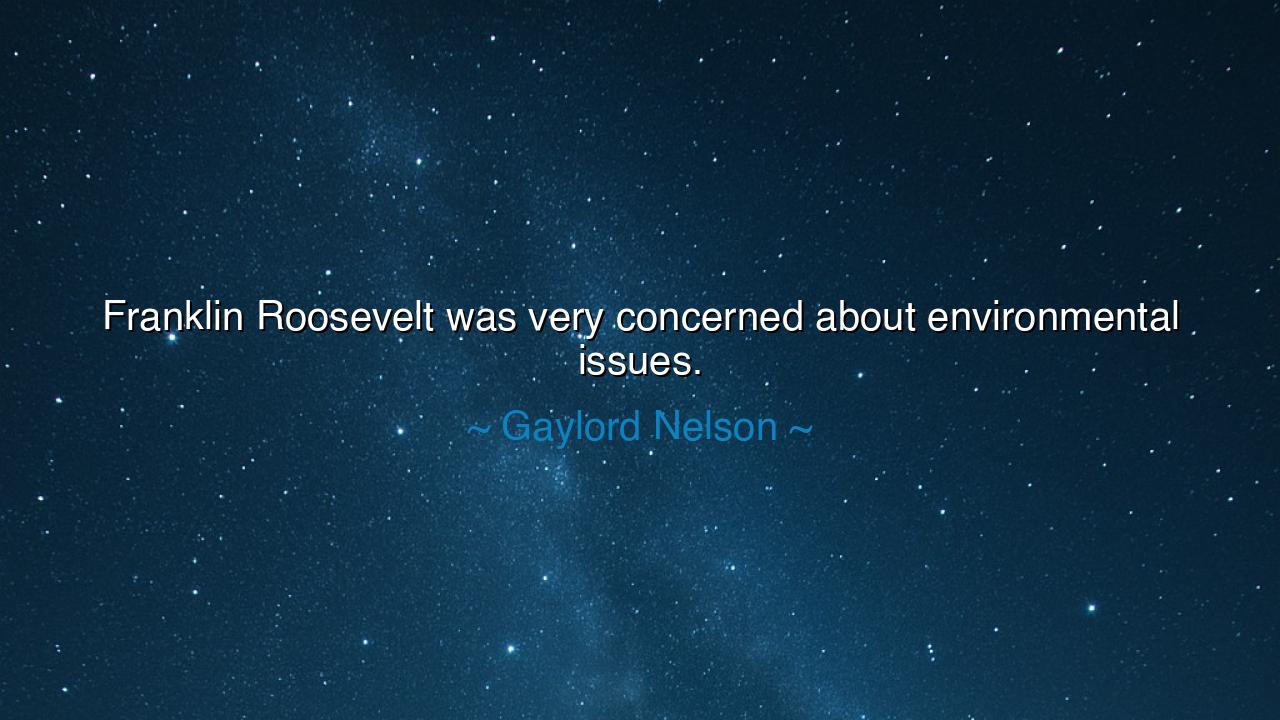
Franklin Roosevelt was very concerned about environmental issues.






When Gaylord Nelson said, “Franklin Roosevelt was very concerned about environmental issues,” he spoke not merely as a historian recalling a past leader, but as a disciple of stewardship honoring a kindred spirit. Beneath these simple words lies a deep recognition: that the health of a nation is bound to the health of its land, and that true leadership must extend its compassion not only to people, but to the earth that sustains them. Nelson, the founder of Earth Day, saw in Franklin D. Roosevelt a predecessor — a man who understood that civilization cannot prosper while its soil, water, and forests decay.
The origin of this quote emerges from the shared vision of two men separated by a generation, yet united by purpose. During the Great Depression, Roosevelt launched the New Deal, not only to heal the economy, but to heal the land itself. Through programs like the Civilian Conservation Corps (CCC) and the Soil Conservation Service, he sent young men into the fields, forests, and mountains to plant trees, restore rivers, and prevent the erosion that had scarred America’s heartland. To Roosevelt, the environment was not a luxury for the rich — it was the inheritance of every citizen, the living foundation of democracy itself. Nelson, who would later champion the environmental awakening of the 1970s, saw this and recognized in Roosevelt a prophet before his time.
To say that Roosevelt was concerned about environmental issues is to recall a leader who saw farther than the crises of his day. While the Dust Bowl choked the skies and stripped the farms bare, he did not respond with despair but with renewal. He believed that the degradation of the earth mirrored the degradation of the human spirit — that to restore the soil was to restore hope. The CCC alone planted over three billion trees, carved trails through national parks, and revived rivers that had run brown with silt. Roosevelt’s vision was not merely practical; it was sacred. He believed the earth was a trust between generations, and that every act of care was a covenant with the future.
In Gaylord Nelson’s eyes, this same spirit guided his own creation of Earth Day in 1970. He had watched pollution choke the skies and rivers once more, just as Roosevelt had seen the dust storms of his youth. He realized that the lessons of the New Deal had been forgotten — that humanity had once again taken more than it had given. By invoking Roosevelt’s name, Nelson was not only honoring the past; he was calling upon the people of his own time to remember the ancient law of balance. The earth gives freely, but it does not forgive endlessly.
History offers many examples of leaders who ignored this truth and paid the price. The ancient Mesopotamians overworked their fields until the salt poisoned their crops. The Romans, in their hunger for empire, felled forests faster than they could regrow, turning fertile lands into desert. Roosevelt and Nelson both understood what those empires forgot: that prosperity without stewardship is a mirage, and that no civilization can outlast the ruin of its own foundation. When Nelson spoke of Roosevelt’s concern, he was reminding humanity that wisdom lies not in domination, but in harmony.
The lesson in this reflection is simple yet profound: care for the earth is the highest form of patriotism. It is not a matter of politics, but of survival — not of ideology, but of reverence. Every tree planted, every river cleaned, every act of conservation is a continuation of Roosevelt’s and Nelson’s shared legacy. To tend the earth is to strengthen the nation; to neglect it is to invite decay. The wise do not inherit the earth from their ancestors — they borrow it from their children.
So, to those who hear this message: remember the covenant. Build cities that breathe, farms that heal, and industries that give back what they take. Follow the example of Franklin D. Roosevelt, who rebuilt a broken land with faith in renewal, and of Gaylord Nelson, who rekindled that faith for a new generation. Let every citizen become a caretaker, every household a sanctuary of sustainability. For the greatness of a nation is not measured only by its power or wealth, but by the harmony it maintains with the living world.
And thus, as the ancients might say, the earth itself is the truest mirror of a people’s soul. When the rivers run clear and the forests stand tall, a nation’s heart is strong. When the land is wasted and the air grows foul, the spirit of its people falters. Gaylord Nelson’s tribute to Franklin Roosevelt is more than history — it is a torch passed across time, a reminder that the destiny of humankind and the destiny of the earth are one and the same.






AAdministratorAdministrator
Welcome, honored guests. Please leave a comment, we will respond soon